时域有限差分法
时域有限差分法
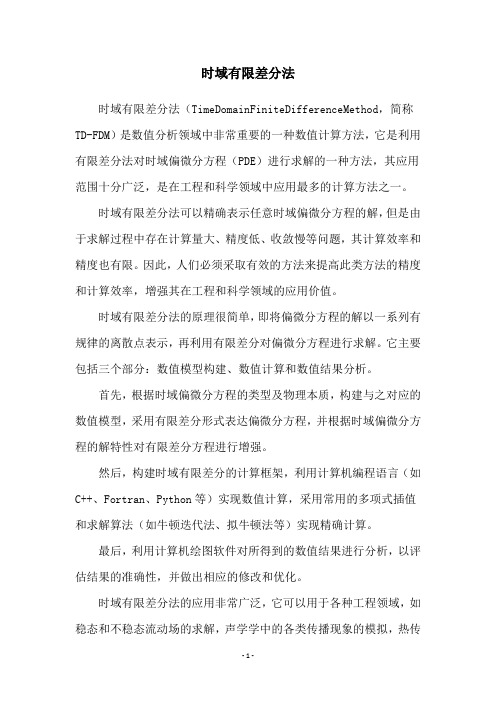
时域有限差分法时域有限差分法(TimeDomainFiniteDifferenceMethod,简称TD-FDM)是数值分析领域中非常重要的一种数值计算方法,它是利用有限差分法对时域偏微分方程(PDE)进行求解的一种方法,其应用范围十分广泛,是在工程和科学领域中应用最多的计算方法之一。
时域有限差分法可以精确表示任意时域偏微分方程的解,但是由于求解过程中存在计算量大、精度低、收敛慢等问题,其计算效率和精度也有限。
因此,人们必须采取有效的方法来提高此类方法的精度和计算效率,增强其在工程和科学领域的应用价值。
时域有限差分法的原理很简单,即将偏微分方程的解以一系列有规律的离散点表示,再利用有限差分对偏微分方程进行求解。
它主要包括三个部分:数值模型构建、数值计算和数值结果分析。
首先,根据时域偏微分方程的类型及物理本质,构建与之对应的数值模型,采用有限差分形式表达偏微分方程,并根据时域偏微分方程的解特性对有限差分方程进行增强。
然后,构建时域有限差分的计算框架,利用计算机编程语言(如C++、Fortran、Python等)实现数值计算,采用常用的多项式插值和求解算法(如牛顿迭代法、拟牛顿法等)实现精确计算。
最后,利用计算机绘图软件对所得到的数值结果进行分析,以评估结果的准确性,并做出相应的修改和优化。
时域有限差分法的应用非常广泛,它可以用于各种工程领域,如稳态和不稳态流动场的求解,声学学中的各类传播现象的模拟,热传导的分析等。
此外,时域有限差分法在一些科学领域也有很大的应用,如量子力学中电子能级结构、原子结构的计算,核物理中文中阳离子反应剂度模拟,生物学中细胞动力学模型仿真等等。
近年来,随着计算机技术的进一步发展,出现了许多新的发展方向:从传统的有限差分法到基于保守型的计算方法,从基于有穷元的数值模拟方法到超差分法,从动态网格特定的方法到基于机器学习的计算方法。
所有这些方法都可以用于处理更复杂的时域偏微分方程,提高精度和计算效率。
时域有限差分法二维

时域有限差分法二维1. 引言时域有限差分法(Finite Difference Time Domain, FDTD)是一种常用的数值计算方法,用于求解电磁场在时域中的传播和辐射问题。
本文将以二维情况为例,深入探讨时域有限差分法的原理和应用。
通过本文的介绍和解读,您将更全面地理解这一方法,并能够灵活应用于相关领域。
2. 时域有限差分法简介2.1 原理概述时域有限差分法是一种迭代求解偏微分方程的方法,通过将时域和空间离散化,将连续问题转化为离散问题。
在二维情况下,假设空间网格分辨率为Δx和Δy,时间步长为Δt。
根据电磁场的麦克斯韦方程组,可以利用中心差分公式进行离散化计算,得到求解方程组的更新方程。
2.2 空间离散化对于二维情况,空间离散化可以采用正交网格或非正交网格。
常见的正交网格包括方形格点、Yee网格等,而非正交网格则具有更灵活的形态。
根据需要和应用场景,选择合适的离散化方法对问题进行求解。
2.3 时间离散化时间离散化主要有显式和隐式两种方法。
显式方法将时间推进方程展开成前一时刻的电场和磁场与当前时刻的源项之间的关系,容易计算但对时间步长有限制;隐式方法则是通过迭代或矩阵计算求解当前时刻的电场和磁场。
3. 时域有限差分法的应用领域时域有限差分法广泛应用于电磁场传播和辐射问题的数值模拟中。
以下是几个典型的应用领域:3.1 辐射问题时域有限差分法可以模拟电磁波在空间中的辐射传播过程。
可以用于分析天线的辐射特性,设计无线通信系统的天线,或者分析电磁波在无线电频段的传播情况。
3.2 波导问题对于波导结构,时域有限差分法可以求解其模式、传输特性等问题。
波导结构广泛应用于光子学器件、微波器件等领域,时域有限差分法为建立数值模型和解析波导特性提供了一种有效的数值计算手段。
3.3 散射问题时域有限差分法在散射问题的数值模拟中也有重要应用。
通过模拟散射体与电磁波的相互作用过程,可以研究和分析散射体的散射特性,例如雷达散射截面的计算、微波散射问题等。
时域有限差分法介绍
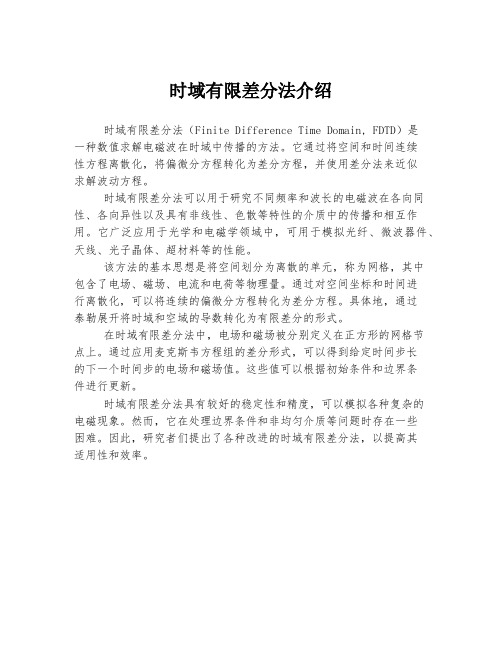
时域有限差分法介绍
时域有限差分法(Finite Difference Time Domain, FDTD)是
一种数值求解电磁波在时域中传播的方法。
它通过将空间和时间连续
性方程离散化,将偏微分方程转化为差分方程,并使用差分法来近似
求解波动方程。
时域有限差分法可以用于研究不同频率和波长的电磁波在各向同性、各向异性以及具有非线性、色散等特性的介质中的传播和相互作用。
它广泛应用于光学和电磁学领域中,可用于模拟光纤、微波器件、天线、光子晶体、超材料等的性能。
该方法的基本思想是将空间划分为离散的单元,称为网格,其中
包含了电场、磁场、电流和电荷等物理量。
通过对空间坐标和时间进
行离散化,可以将连续的偏微分方程转化为差分方程。
具体地,通过
泰勒展开将时域和空域的导数转化为有限差分的形式。
在时域有限差分法中,电场和磁场被分别定义在正方形的网格节
点上。
通过应用麦克斯韦方程组的差分形式,可以得到给定时间步长
的下一个时间步的电场和磁场值。
这些值可以根据初始条件和边界条
件进行更新。
时域有限差分法具有较好的稳定性和精度,可以模拟各种复杂的
电磁现象。
然而,它在处理边界条件和非均匀介质等问题时存在一些
困难。
因此,研究者们提出了各种改进的时域有限差分法,以提高其
适用性和效率。
时域有限差分方法、编程技巧与应用
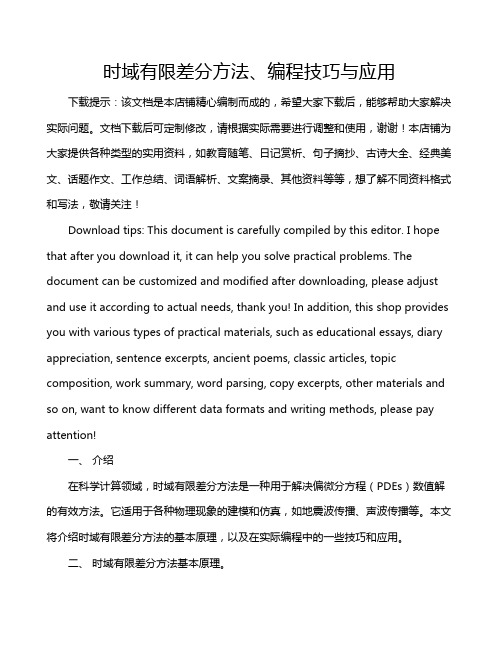
时域有限差分方法、编程技巧与应用下载提示:该文档是本店铺精心编制而成的,希望大家下载后,能够帮助大家解决实际问题。
文档下载后可定制修改,请根据实际需要进行调整和使用,谢谢!本店铺为大家提供各种类型的实用资料,如教育随笔、日记赏析、句子摘抄、古诗大全、经典美文、话题作文、工作总结、词语解析、文案摘录、其他资料等等,想了解不同资料格式和写法,敬请关注!Download tips: This document is carefully compiled by this editor. I hope that after you download it, it can help you solve practical problems. The document can be customized and modified after downloading, please adjust and use it according to actual needs, thank you! In addition, this shop provides you with various types of practical materials, such as educational essays, diary appreciation, sentence excerpts, ancient poems, classic articles, topic composition, work summary, word parsing, copy excerpts, other materials and so on, want to know different data formats and writing methods, please pay attention!一、介绍在科学计算领域,时域有限差分方法是一种用于解决偏微分方程(PDEs)数值解的有效方法。
时域有限差分法关键技术及其应用研究

时域有限差分法关键技术及其应用研究时域有限差分法关键技术及其应用研究1. 引言时域有限差分法(Finite Difference Time Domain, FDTD)是一种常见的数值电磁计算方法,被广泛应用于电磁场的数值模拟和分析。
本文将介绍FDTD方法的基本原理及其一些关键技术,重点探讨其在电磁场模拟、天线研究和光学器件设计等领域的应用。
2. FDTD方法基本原理FDTD方法采用时空网格来离散求解麦克斯韦方程组,通过迭代的方式计算电磁场的时变分布。
其基本原理是利用麦克斯韦方程组的时域形式,将电场和磁场的空间导数用有限差分的形式进行近似,通过时间步进来模拟电磁场的时域行为。
FDTD方法的关键是对时空网格的离散化处理。
在时域,时间和空间被离散为等间距的格点,电磁场在格点之间通过有限差分方程进行计算,从而得到电场和磁场在每个格点的数值。
通过时间步进的迭代计算,可以模拟电磁场随时间的演化过程。
3. FDTD方法的关键技术3.1 源的建立在FDTD方法中,需要设置适当的源来激发电磁场的变化。
常见的源包括点源、平面波源和边界条件处理等。
点源是在空间某一点施加突变的电场或磁场,用于模拟电磁波的辐射和传播;平面波源是在一个平面波入射,模拟平面波在介质中的传播行为;边界条件处理则是为了模拟无限大空间中的电磁波的传播。
3.2 时间步进时间步进是FDTD方法中的一个关键技术,决定了电场和磁场的更新方式。
常用的时间步进算法有显式和隐式两种。
显式时间步进是根据已知的电场和磁场的数值,通过有限差分方程计算新的电场和磁场的值;隐式时间步进则是使用迭代或矩阵求解的方法,利用已知的旧场和新场的关系求解新场。
3.3 网格约束条件FDTD方法中需要设置一些约束条件,以满足电磁场在网格边界条件下的数值计算。
常见的约束条件有吸收边界条件和周期性边界条件。
吸收边界条件是用于吸收入射电磁波的反射波,常用的吸收边界条件有Mur吸收边界条件和PML吸收边界条件;周期性边界条件是为了模拟周期性结构或周期性辐射场景,将仿真空间分割成无限个重复的周期结构。
时域有限差分法
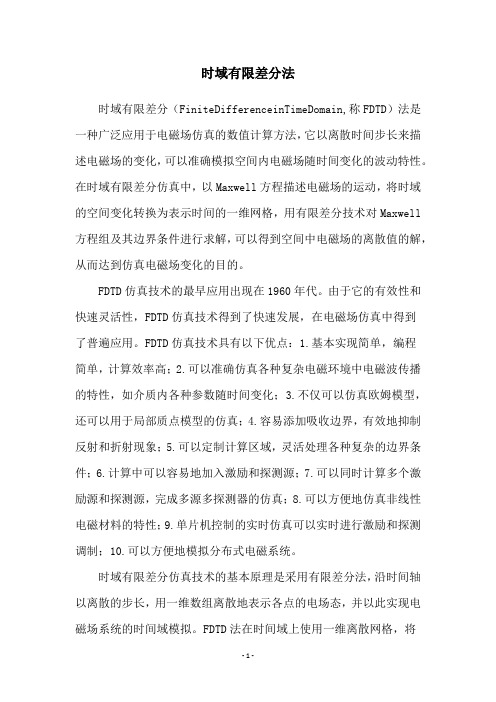
时域有限差分法时域有限差分(FiniteDifferenceinTimeDomain,称FDTD)法是一种广泛应用于电磁场仿真的数值计算方法,它以离散时间步长来描述电磁场的变化,可以准确模拟空间内电磁场随时间变化的波动特性。
在时域有限差分仿真中,以Maxwell方程描述电磁场的运动,将时域的空间变化转换为表示时间的一维网格,用有限差分技术对Maxwell 方程组及其边界条件进行求解,可以得到空间中电磁场的离散值的解,从而达到仿真电磁场变化的目的。
FDTD仿真技术的最早应用出现在1960年代。
由于它的有效性和快速灵活性,FDTD仿真技术得到了快速发展,在电磁场仿真中得到了普遍应用。
FDTD仿真技术具有以下优点:1.基本实现简单,编程简单,计算效率高;2.可以准确仿真各种复杂电磁环境中电磁波传播的特性,如介质内各种参数随时间变化;3.不仅可以仿真欧姆模型,还可以用于局部质点模型的仿真;4.容易添加吸收边界,有效地抑制反射和折射现象;5.可以定制计算区域,灵活处理各种复杂的边界条件;6.计算中可以容易地加入激励和探测源;7.可以同时计算多个激励源和探测源,完成多源多探测器的仿真;8.可以方便地仿真非线性电磁材料的特性;9.单片机控制的实时仿真可以实时进行激励和探测调制;10.可以方便地模拟分布式电磁系统。
时域有限差分仿真技术的基本原理是采用有限差分法,沿时间轴以离散的步长,用一维数组离散地表示各点的电场态,并以此实现电磁场系统的时间域模拟。
FDTD法在时间域上使用一维离散网格,将Maxwell方程组及其边界条件分解,分别应用一阶导数近似公式(如中心差分公式)求解,按照计算元(grid point)在时空域中的局部特性,分别设定电磁场源、介质参数和边界条件,利用时域有限差分公式迭代求解Maxwell方程,可以得到边界条件和激励源允许的范围内的空间中的电磁场的离散值的解,从而达到仿真电磁场变化的目的。
借助时域有限差分法可以实现对天线、微波传输线、无线局域网、雷达、全波器件等电磁系统的仿真,其结果可以用于设计、性能预测、状态诊断、运行维护、电磁干扰抑制等诸多应用领域。
时域有限差分法PPT课件

vg
d
dk
c
(1-10)
这种情况下,群速也是与频率无关。
.
8
1.2 数值色散关系(2)
上述过程也可用于一维标量波动方程差分近似的数值色散分析。
设在离散空间点 xi,tn,离散行波解为 u in u x i,tn e j n t k ~ i x ,
式中,k~ 为存在于有限差分网格中的数值正弦波的波数。一般情况 下,不同于连续物理波的波数。正是这种不同导致了数值相速和群 速偏离了精确解。进而导致了数值色散误差。
1.5 数值稳定性(1)
• FDTD计算中每一步都是有误差的,随着时间步进,误 差会不断积累。如果误差的积累不会造成总误差的增 加,就成FDTD法是稳定的,否则成为不稳定的。数值 不稳定性会造成计算结果随时间步进无限增加。
• FDTD法是有条件稳定的,即:时间步必须必须小于一 定值以避免数值不稳定性。
考虑(1.1)的正弦行波解 ux,tejtkx 代入(1-1)得
j2c2jk2 即
k c
上式便是一维标量波动方程的色散关系。
(1-8)
由上式得相速度
vp
k
c
(1-9)
可见,相速与频率无关,称为非色散。非色散意味着对于具有任意
调制的包络或脉冲形状的波传播任意距离后波形保持不变。进一步
由(1-8)可以得到群速关系
正弦函数
ui=sin(nt+)
高斯函数
ui=exp[-(n-n0)2/T2]
阶跃函数
ui= 0
n<n1
= ( n-n1)/(n2-n1) n1<n<n2
=1
n>n2
“硬源”设置简单,但当反射波回到“硬源”位置时, 会引起寄生反射,所以,要在这之前“关”掉源。
时域有限差分
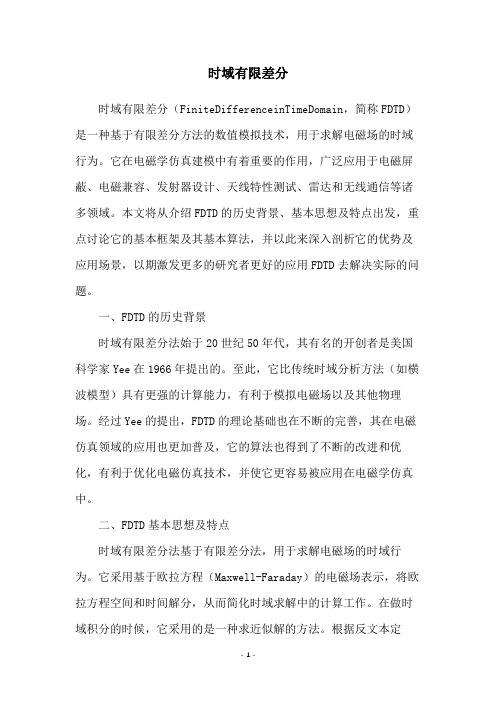
时域有限差分时域有限差分(FiniteDifferenceinTimeDomain,简称FDTD)是一种基于有限差分方法的数值模拟技术,用于求解电磁场的时域行为。
它在电磁学仿真建模中有着重要的作用,广泛应用于电磁屏蔽、电磁兼容、发射器设计、天线特性测试、雷达和无线通信等诸多领域。
本文将从介绍FDTD的历史背景、基本思想及特点出发,重点讨论它的基本框架及其基本算法,并以此来深入剖析它的优势及应用场景,以期激发更多的研究者更好的应用FDTD去解决实际的问题。
一、FDTD的历史背景时域有限差分法始于20世纪50年代,其有名的开创者是美国科学家Yee在1966年提出的。
至此,它比传统时域分析方法(如横波模型)具有更强的计算能力,有利于模拟电磁场以及其他物理场。
经过Yee的提出,FDTD的理论基础也在不断的完善,其在电磁仿真领域的应用也更加普及,它的算法也得到了不断的改进和优化,有利于优化电磁仿真技术,并使它更容易被应用在电磁学仿真中。
二、FDTD基本思想及特点时域有限差分法基于有限差分法,用于求解电磁场的时域行为。
它采用基于欧拉方程(Maxwell-Faraday)的电磁场表示,将欧拉方程空间和时间解分,从而简化时域求解中的计算工作。
在做时域积分的时候,它采用的是一种求近似解的方法。
根据反文本定理,这种求近似解的方法能够准确地表示电磁场的时变行为,从而正确地描述电磁场在空间和时间上的变化规律。
在求解电磁场的时候,它把分析的小单元划分成不同的网格,每个网格为一个小空间,把大量的电磁场计算转换成了大量的有限差分的计算,从而极大地简化了电磁场的模拟,节约了计算时间。
另外,FDTD还具有计算简单、模拟效率高、模拟准确等优点,因此在电磁学仿真中非常受到重视。
三、FDTD的基本框架及其基本算法FDTD的基本框架由应变和电场两个部分构成,两个部分相互协作,用来计算空间上电磁场的变化过程,以及对应的时间变化过程。
其基本算法由三个步骤构成:(1)横电场更新,先从欧拉方程计算横电场;(2)纵电场更新,再从欧拉方程计算纵电场;(3)应变更新,最后从欧拉方程计算应变。
电磁波时域有限差分方法
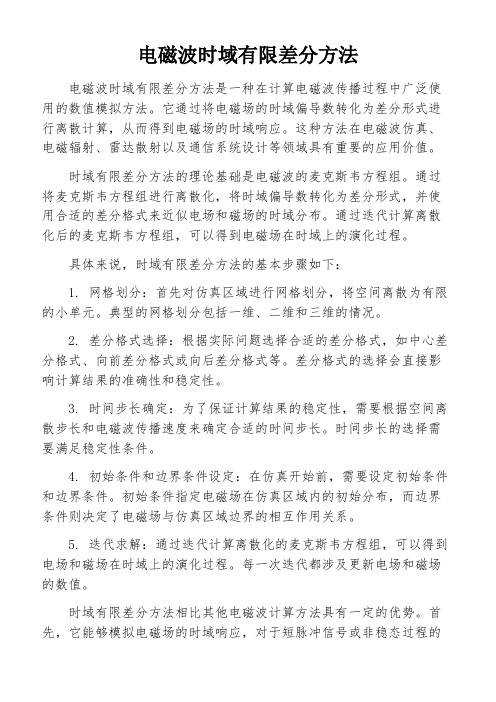
电磁波时域有限差分方法电磁波时域有限差分方法是一种在计算电磁波传播过程中广泛使用的数值模拟方法。
它通过将电磁场的时域偏导数转化为差分形式进行离散计算,从而得到电磁场的时域响应。
这种方法在电磁波仿真、电磁辐射、雷达散射以及通信系统设计等领域具有重要的应用价值。
时域有限差分方法的理论基础是电磁波的麦克斯韦方程组。
通过将麦克斯韦方程组进行离散化,将时域偏导数转化为差分形式,并使用合适的差分格式来近似电场和磁场的时域分布。
通过迭代计算离散化后的麦克斯韦方程组,可以得到电磁场在时域上的演化过程。
具体来说,时域有限差分方法的基本步骤如下:1. 网格划分:首先对仿真区域进行网格划分,将空间离散为有限的小单元。
典型的网格划分包括一维、二维和三维的情况。
2. 差分格式选择:根据实际问题选择合适的差分格式,如中心差分格式、向前差分格式或向后差分格式等。
差分格式的选择会直接影响计算结果的准确性和稳定性。
3. 时间步长确定:为了保证计算结果的稳定性,需要根据空间离散步长和电磁波传播速度来确定合适的时间步长。
时间步长的选择需要满足稳定性条件。
4. 初始条件和边界条件设定:在仿真开始前,需要设定初始条件和边界条件。
初始条件指定电磁场在仿真区域内的初始分布,而边界条件则决定了电磁场与仿真区域边界的相互作用关系。
5. 迭代求解:通过迭代计算离散化的麦克斯韦方程组,可以得到电场和磁场在时域上的演化过程。
每一次迭代都涉及更新电场和磁场的数值。
时域有限差分方法相比其他电磁波计算方法具有一定的优势。
首先,它能够模拟电磁场的时域响应,对于短脉冲信号或非稳态过程的仿真非常有用。
其次,它在空域和频域上的计算误差相对较小,并且可以处理各种不规则形状的仿真区域。
此外,时域有限差分方法还可以结合其他方法,如有限元方法和边界元方法,进行更精确的仿真计算。
虽然时域有限差分方法在电磁波仿真中取得了显著的成果,但它也存在一些局限性。
首先,它的计算速度相对较慢,特别是在三维仿真中。
FDTD时域有限差分法

对时间离散:
(2)
FDTD基本原理(续)
9
为了满足(1)式空间精度的要求,并满足(2)式,Yee 把空间任一网格上的E和H的六个分量,如下图放置:
Yee把E 和H 在时间长相差半个步长计算(为了满足精度的要求)。
FDTD基本原理(续)
10
根据这一原则可以写出六个差分方程:
每个网格点上的各场分量的新值依赖于该点在前一时间步长时刻 的值,即该点周围的邻近点上另一场量在早半个时间步长时的值。 因此任一时刻可一次算出一个点,并行算法可计算出多个点。通 过这些运算可以交替算出电场磁场在各个时间步的值。
C:为光速,自由空间中: c
数值色散
14
• 产生原因
–FDTD网格中,会导致数字波模在网格中发生改变,这种改 变是由于计算网格本身引起的,而非物理因素,所以必须 考虑
• 适当选取时间步长,空间步长,传播方向,可以得到 理想情况
–3-D方形网格:取波沿对角线传播 (数值稳定的极限状态),可得理想色散关系。 –2-D方形网格:也是沿对角线传播, (也是数值稳定的极限状态) –1-D网格 (数值稳定的极限状态)
参考文献
21
• 电磁波时域有限差分方法(第二版),葛德彪, 闫玉波,西安电子科技大学出版社 • 工程电磁场数值计算,倪光正
22
练习要求:
时域有限差分法(FDTD算法)的基本原理及仿真
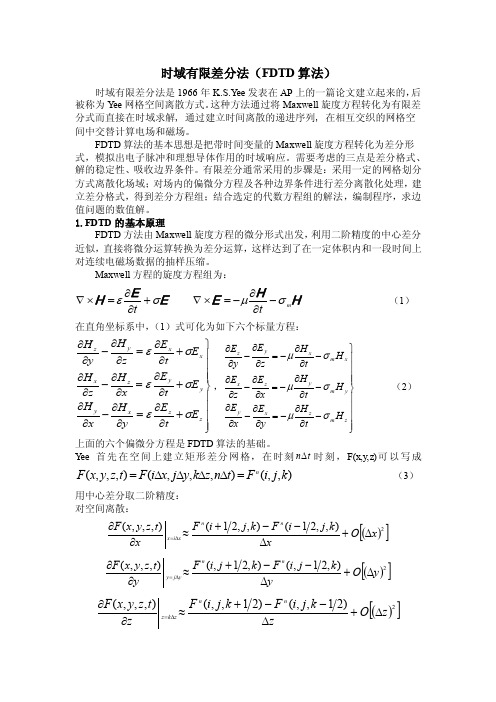
时域有限差分法(FDTD 算法)时域有限差分法是1966年K.S.Y ee 发表在AP 上的一篇论文建立起来的,后被称为Y ee 网格空间离散方式。
这种方法通过将Maxwell 旋度方程转化为有限差分式而直接在时域求解, 通过建立时间离散的递进序列, 在相互交织的网格空间中交替计算电场和磁场。
FDTD 算法的基本思想是把带时间变量的Maxwell 旋度方程转化为差分形式,模拟出电子脉冲和理想导体作用的时域响应。
需要考虑的三点是差分格式、解的稳定性、吸收边界条件。
有限差分通常采用的步骤是:采用一定的网格划分方式离散化场域;对场内的偏微分方程及各种边界条件进行差分离散化处理,建立差分格式,得到差分方程组;结合选定的代数方程组的解法,编制程序,求边值问题的数值解。
1.FDTD 的基本原理FDTD 方法由Maxwell 旋度方程的微分形式出发,利用二阶精度的中心差分近似,直接将微分运算转换为差分运算,这样达到了在一定体积内和一段时间上对连续电磁场数据的抽样压缩。
Maxwell 方程的旋度方程组为:E EH σε+∂∂=⨯∇tH H E m t σμ-∂∂-=⨯∇ (1) 在直角坐标系中,(1)式可化为如下六个标量方程:⎪⎪⎪⎪⎭⎪⎪⎪⎪⎬⎫+∂∂=∂∂-∂∂+∂∂=∂∂-∂∂+∂∂=∂∂-∂∂z z x y y y z x x x yz E t E y H x H E t E x H z H E t E z H y H σεσεσε,⎪⎪⎪⎪⎭⎪⎪⎪⎪⎬⎫-∂∂-=∂∂-∂∂-∂∂-=∂∂-∂∂-∂∂-=∂∂-∂∂z m zx y y m y z x x m x y z H t H y E x E H t H x E z E H t H z E y E σμσμσμ (2)上面的六个偏微分方程是FDTD 算法的基础。
Y ee 首先在空间上建立矩形差分网格,在时刻t n ∆时刻,F(x,y ,z)可以写成),,(),,,(),,,(k j i F t n z k y j x i F t z y x F n =∆∆∆∆= (3)用中心差分取二阶精度: 对空间离散:()[]2),,21(),,21(),,,(x O xk j i F k j i F x t z y x F n n xi x ∆+∆--+≈∂∂∆= ()[]2),21,(),21,(),,,(y O yk j i F k j i F y t z y x F n n yj y ∆+∆--+≈∂∂∆= ()[]2)21,,()21,,(),,,(z O zk j i F k j i F z t z y x F n n zk z ∆+∆--+≈∂∂∆=对时间离散:()[]22121),,(),,(),,,(t O tk j i F k j i F t t z y x F n n tn t ∆+∆-≈∂∂-+∆= (4) Y ee 把空间任一网格上的E 和H 的六个分量,如下图放置:oyxzEyHzExEzHxEyEyEzEx HyEzEx图1 Y ee 氏网格及其电磁场分量分布在FDTD 中,空间上连续分布的电磁场物理量离散的空间排布如图所示。
时域有限差分方法
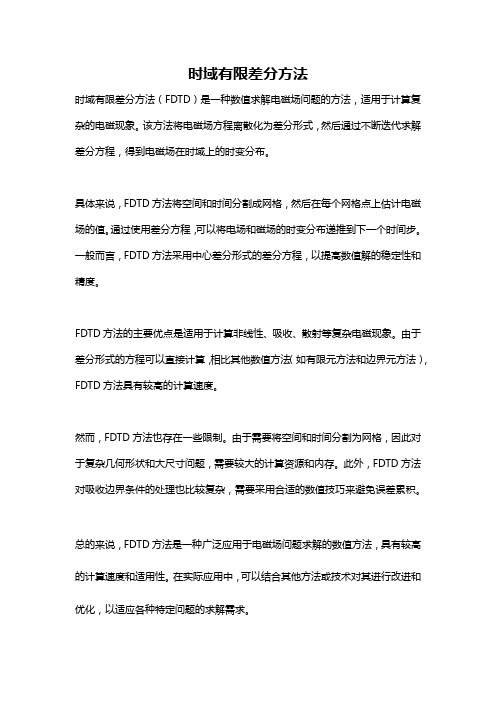
时域有限差分方法
时域有限差分方法(FDTD)是一种数值求解电磁场问题的方法,适用于计算复杂的电磁现象。
该方法将电磁场方程离散化为差分形式,然后通过不断迭代求解差分方程,得到电磁场在时域上的时变分布。
具体来说,FDTD方法将空间和时间分割成网格,然后在每个网格点上估计电磁场的值。
通过使用差分方程,可以将电场和磁场的时变分布递推到下一个时间步。
一般而言,FDTD方法采用中心差分形式的差分方程,以提高数值解的稳定性和精度。
FDTD方法的主要优点是适用于计算非线性、吸收、散射等复杂电磁现象。
由于差分形式的方程可以直接计算,相比其他数值方法(如有限元方法和边界元方法),FDTD方法具有较高的计算速度。
然而,FDTD方法也存在一些限制。
由于需要将空间和时间分割为网格,因此对于复杂几何形状和大尺寸问题,需要较大的计算资源和内存。
此外,FDTD方法对吸收边界条件的处理也比较复杂,需要采用合适的数值技巧来避免误差累积。
总的来说,FDTD方法是一种广泛应用于电磁场问题求解的数值方法,具有较高的计算速度和适用性。
在实际应用中,可以结合其他方法或技术对其进行改进和优化,以适应各种特定问题的求解需求。
时域有限差分法fdtd算法
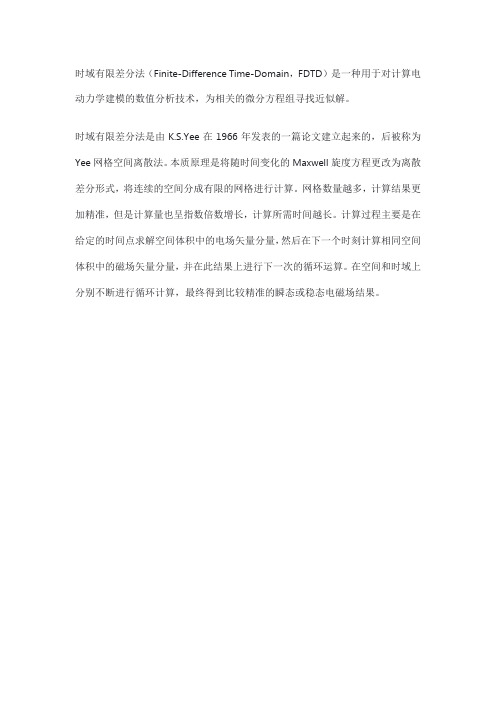
时域有限差分法(Finite-Difference Time-Domain,FDTD)是一种用于对计算电动力学建模的数值分析技术,为相关的微分方程组寻找近似解。
时域有限差分法是由K.S.Yee在1966年发表的一篇论文建立起来的,后被称为Yee网格空间离散法。
本质原理是将随时间变化的Maxwell旋度方程更改为离散差分形式,将连续的空间分成有限的网格进行计算。
网格数量越多,计算结果更加精准,但是计算量也呈指数倍数增长,计算所需时间越长。
计算过程主要是在给定的时间点求解空间体积中的电场矢量分量,然后在下一个时刻计算相同空间体积中的磁场矢量分量,并在此结果上进行下一次的循环运算。
在空间和时域上分别不断进行循环计算,最终得到比较精准的瞬态或稳态电磁场结果。
时域有限差分法

时域有限差分法时域有限差分法是一种有效的解决数值计算中微分方程的方法,它深受数学、物理、工程、生物和其他领域的研究者们的重视。
它可以用来解决各种复杂的微分方程以及在工程、航空、医学、控制等方面形成重要的分析工具和模型。
时域有限差分法诞生于20世纪60年代,它是一种有效的数值解法,通过将求解微分方程的过程转化为一系列简单的计算步骤来实现。
它的基本思想是,通过对数值函数的有限多项式拟合,将微分方程分段变换为一个简单的离散数据集,并使用其中的方程来求解问题。
时域有限差分法的关键部分之一是分子格栅。
分子格栅是一种数值技术,它利用一组有限的数值点,使得一组变量随时间的变化具有渐进性,从而得到了高精度的计算结果。
它可以用来求解多种微分方程,如常微分方程、偏微分方程、椭圆型方程、非线性方程、矩阵方程等等。
随着时域有限差分法的发展,越来越多的应用出现了,例如在气动学中可以用来模拟气体流动,在控制学中可以用来研究控制系统的动态行为等等。
同时,有限差分法作为一种数值方法,也可以应用于经典的有限差分方程的求解,它的实际应用十分广泛,促进了许多领域的发展。
以上就是时域有限差分法的基本介绍,本文介绍了时域有限差分法的原理与特点、发展历史以及它在各个领域中的应用情况。
时域有限差分法深受世界各地研究者的重视,它的应用开拓了许多新的研究领域,并带来了许多新的发现。
由于它的稳定性高,计算精度高,耗时少、分散性强,被广泛应用于工程、航空、医学和控制等领域,成为重要的分析工具与模型,为这些领域的发展做出了巨大的贡献。
总之,时域有限差分法是一种重要的数值计算方法,为各种研究领域都提供了有效的分析手段,发挥了重要的作用。
它不仅提高了数值计算的精度,而且还大大提高了计算效率,节省了研究成本,使许多研究领域得到了快速发展和提升,受到了广大研究者的重视和喜爱。
时域有限差分法
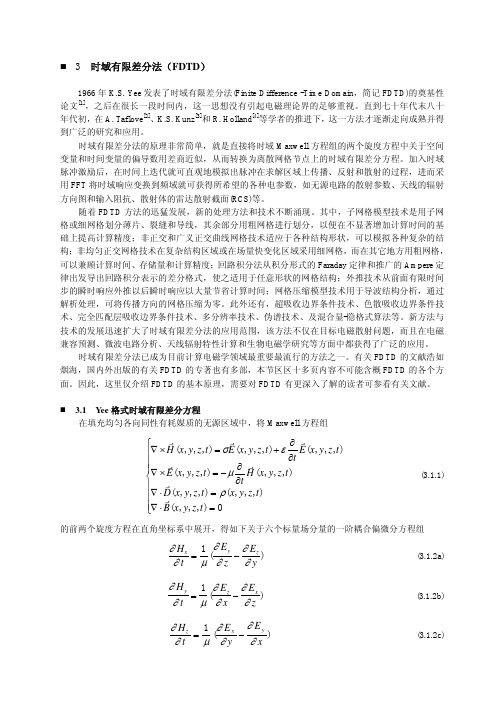
3 时域有限差分法(FDTD )1966年K.S. Yee 发表了时域有限差分法(Finite Difference -Time Domain ,简记FDTD)的奠基性论文[1],之后在很长一段时间内,这一思想没有引起电磁理论界的足够重视。
直到七十年代末八十年代初,在A. Taflove [2]、K.S. Kunz [3]和R. Holland [4]等学者的推进下,这一方法才逐渐走向成熟并得到广泛的研究和应用。
时域有限差分法的原理非常简单,就是直接将时域Maxwell 方程组的两个旋度方程中关于空间变量和时间变量的偏导数用差商近似,从而转换为离散网格节点上的时域有限差分方程。
加入时域脉冲激励后,在时间上迭代就可直观地模拟出脉冲在求解区域上传播、反射和散射的过程,进而采用FFT 将时域响应变换到频域就可获得所希望的各种电参数,如无源电路的散射参数、天线的辐射方向图和输入阻抗、散射体的雷达散射截面(RCS)等。
随着FDTD 方法的迅猛发展,新的处理方法和技术不断涌现。
其中,子网格模型技术是用子网格或细网格划分薄片、裂缝和导线,其余部分用粗网格进行划分,以便在不显著增加计算时间的基础上提高计算精度;非正交和广义正交曲线网格技术适应于各种结构形状,可以模拟各种复杂的结构;非均匀正交网格技术在复杂结构区域或在场量快变化区域采用细网格,而在其它地方用粗网格,可以兼顾计算时间、存储量和计算精度;回路积分法从积分形式的Faraday 定律和推广的Ampere 定律出发导出回路积分表示的差分格式,使之适用于任意形状的网格结构;外推技术从前面有限时间步的瞬时响应外推以后瞬时响应以大量节省计算时间;网格压缩模型技术用于导波结构分析,通过解析处理,可将传播方向的网格压缩为零。
此外还有,超吸收边界条件技术、色散吸收边界条件技术、完全匹配层吸收边界条件技术、多分辨率技术、伪谱技术、及混合显-隐格式算法等。
新方法与技术的发展迅速扩大了时域有限差分法的应用范围,该方法不仅在目标电磁散射问题,而且在电磁兼容预测、微波电路分析、天线辐射特性计算和生物电磁学研究等方面中都获得了广泛的应用。
时域有限差分法的基本原理及仿真
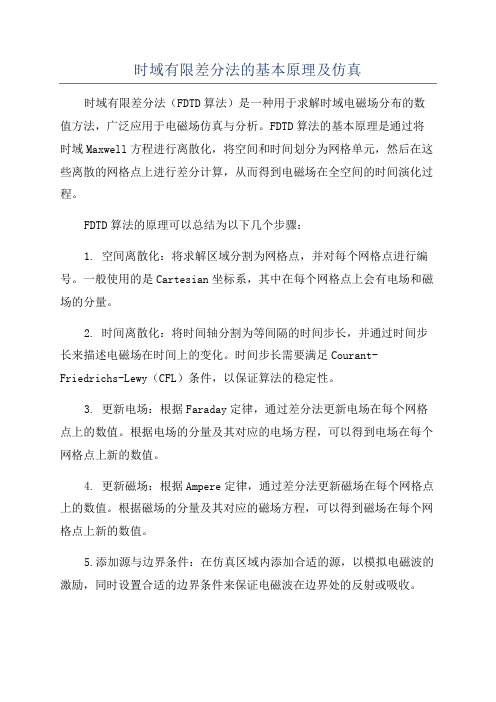
时域有限差分法的基本原理及仿真时域有限差分法(FDTD算法)是一种用于求解时域电磁场分布的数值方法,广泛应用于电磁场仿真与分析。
FDTD算法的基本原理是通过将时域Maxwell方程进行离散化,将空间和时间划分为网格单元,然后在这些离散的网格点上进行差分计算,从而得到电磁场在全空间的时间演化过程。
FDTD算法的原理可以总结为以下几个步骤:1. 空间离散化:将求解区域分割为网格点,并对每个网格点进行编号。
一般使用的是Cartesian坐标系,其中在每个网格点上会有电场和磁场的分量。
2. 时间离散化:将时间轴分割为等间隔的时间步长,并通过时间步长来描述电磁场在时间上的变化。
时间步长需要满足Courant-Friedrichs-Lewy(CFL)条件,以保证算法的稳定性。
3. 更新电场:根据Faraday定律,通过差分法更新电场在每个网格点上的数值。
根据电场的分量及其对应的电场方程,可以得到电场在每个网格点上新的数值。
4. 更新磁场:根据Ampere定律,通过差分法更新磁场在每个网格点上的数值。
根据磁场的分量及其对应的磁场方程,可以得到磁场在每个网格点上新的数值。
5.添加源与边界条件:在仿真区域内添加合适的源,以模拟电磁波的激励,同时设置合适的边界条件来保证电磁波在边界处的反射或吸收。
6.迭代求解:通过反复迭代执行步骤3和步骤4,以实现电磁场在全空间的时间演化过程。
每次迭代,电磁场都会根据已知的电磁场状态进行更新,直到达到设定终止条件。
FDTD算法的仿真过程可以描述如下:1.初始化电场和磁场:根据初始条件,设置仿真区域内电场和磁场的初值。
2.迭代求解电场和磁场:在每个时间步长内,按照步骤3和步骤4的方法更新电场和磁场的数值。
3.添加源与边界条件:在每个时间步长内,根据场源和边界条件的设置,更新仿真区域内的电磁场状态。
4.重复执行步骤2和步骤3,直到达到设定的仿真时间或满足终止条件。
FDTD算法具有广泛的应用领域,在电磁场仿真、天线设计、光学器件设计以及雷达散射等领域都有重要的应用。
时域有限差分法介绍
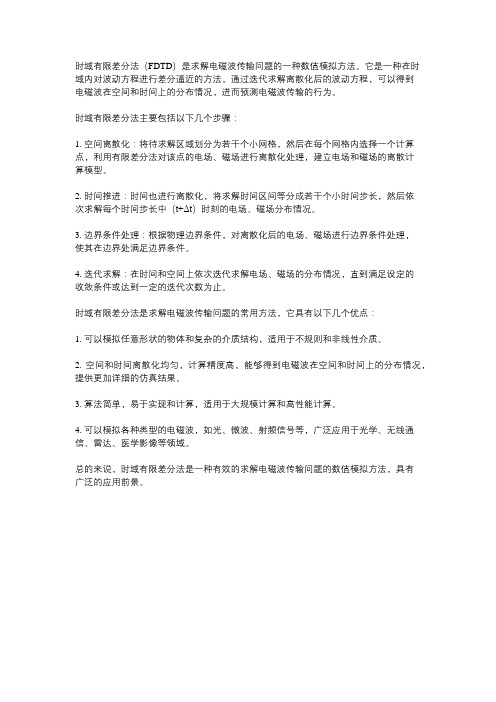
时域有限差分法(FDTD)是求解电磁波传输问题的一种数值模拟方法。
它是一种在时域内对波动方程进行差分逼近的方法,通过迭代求解离散化后的波动方程,可以得到
电磁波在空间和时间上的分布情况,进而预测电磁波传输的行为。
时域有限差分法主要包括以下几个步骤:
1. 空间离散化:将待求解区域划分为若干个小网格,然后在每个网格内选择一个计算点,利用有限差分法对该点的电场、磁场进行离散化处理,建立电场和磁场的离散计
算模型。
2. 时间推进:时间也进行离散化,将求解时间区间等分成若干个小时间步长,然后依
次求解每个时间步长中(t+Δt)时刻的电场、磁场分布情况。
3. 边界条件处理:根据物理边界条件,对离散化后的电场、磁场进行边界条件处理,
使其在边界处满足边界条件。
4. 迭代求解:在时间和空间上依次迭代求解电场、磁场的分布情况,直到满足设定的
收敛条件或达到一定的迭代次数为止。
时域有限差分法是求解电磁波传输问题的常用方法,它具有以下几个优点:
1. 可以模拟任意形状的物体和复杂的介质结构,适用于不规则和非线性介质。
2. 空间和时间离散化均匀,计算精度高,能够得到电磁波在空间和时间上的分布情况,提供更加详细的仿真结果。
3. 算法简单,易于实现和计算,适用于大规模计算和高性能计算。
4. 可以模拟各种类型的电磁波,如光、微波、射频信号等,广泛应用于光学、无线通信、雷达、医学影像等领域。
总的来说,时域有限差分法是一种有效的求解电磁波传输问题的数值模拟方法,具有
广泛的应用前景。
时域有限差分法的六阶形式

时域有限差分法的六阶形式
时域有限差分法(Finite-Difference Time-Domain, FDTD)是一种用于模拟电磁波在时间和空间中的传播行为的数值方法。
在FDTD中,电磁场的各个分量在离散的时间和空间网格上进行差分近似。
通常,FDTD的基础是二阶精度的,这意味着它使用电场和磁场分量的一阶时间导数和二阶空间导数来近似麦克斯韦方程。
然而,为了获得更高的精度,可以开发更高阶的FDTD方案,例如六阶FDTD。
六阶FDTD方案意味着在时间和空间上的导数近似将使用更高阶的差分公式。
这通常涉及更复杂的差分系数和更多的邻近网格点,以更精确地逼近连续函数的导数。
对于六阶FDTD方案的具体形式,它通常涉及电场和磁场分量的六阶空间导数和四阶时间导数。
这些高阶导数需要更复杂的差分系数和更多的网格点来计算。
由于六阶FDTD方案的具体实现可能因研究者和应用的不同而有所差异,因此没有通用的标准形式。
通常,这些方案是通过研究高阶差分公式和数值稳定性条件来开发的,并且可能涉及复杂的数学推导和计算机编程实现。
如果您需要具体的六阶FDTD方案,我建议您查阅相关的研究文献或教科书,以了解特定应用或问题中使用的具体方法和公式。
这些文献通常会提供详细的数学推导、算法实现和数值实验,以验证所提出的高阶FDTD方案的有效性和准确性。
第十一章-时域有限差分方法
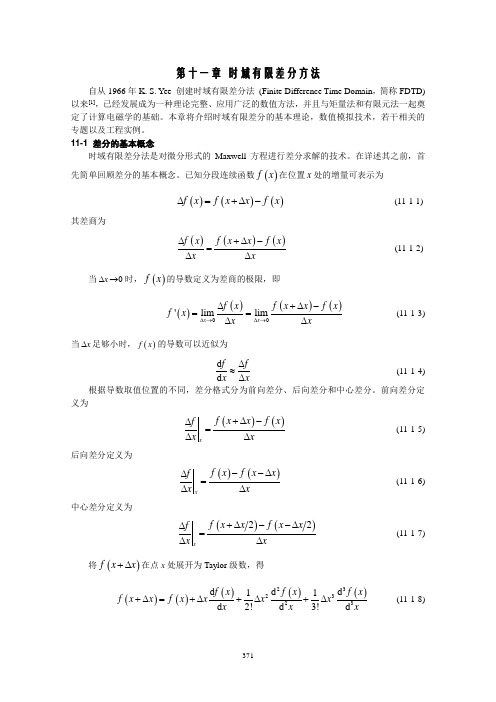
第十一章 时域有限差分方法自从1966年K. S. Yee 创建时域有限差分法 (Finite Difference Time Domain ,简称FDTD) 以来[1],已经发展成为一种理论完整、应用广泛的数值方法,并且与矩量法和有限元法一起奠定了计算电磁学的基础。
本章将介绍时域有限差分的基本理论,数值模拟技术,若干相关的专题以及工程实例。
11-1 差分的基本概念时域有限差分法是对微分形式的Maxwell 方程进行差分求解的技术。
在详述其之前,首先简单回顾差分的基本概念。
已知分段连续函数()f x 在位置x 处的增量可表示为()()()f x f x x f x ∆=+∆- (11-1-1)其差商为()()()f x f x x f x xx∆+∆-=∆∆ (11-1-2)当x ∆→0时,()f x 的导数定义为差商的极限,即()()()()'limlimx x f x f x x f x f x xx∆→∆→∆+∆-==∆∆ (11-1-3)当x ∆足够小时,()f x 的导数可以近似为d d f fx x∆≈∆ (11-1-4) 根据导数取值位置的不同,差分格式分为前向差分、后向差分和中心差分。
前向差分定义为()()x f x x f x fx x+∆-∆=∆∆ (11-1-5) 后向差分定义为()()x f x f x x fx x--∆∆=∆∆ (11-1-6) 中心差分定义为()()22x f x x f x x fx x+∆--∆∆=∆∆ (11-1-7) 将()f x x +∆在点x 处展开为Taylor 级数,得()()()()()232323d d d 11d 2!d 3!d f x f x f x f x x f x x x x x x x+∆=+∆+∆+∆ (11-1-8)()()()()()232323d d d 11d 2!d 3!d f x f x f x f x x f x x x x x x x-∆=-∆+∆-∆ (11-1-9)将方程 (11-1-8) 和 (11-1-9) 代入 (11-1-5) ~ (11-1-7)后可以发现,前向和后向差分具有一阶精度,中心差分具有二阶精度。
- 1、下载文档前请自行甄别文档内容的完整性,平台不提供额外的编辑、内容补充、找答案等附加服务。
- 2、"仅部分预览"的文档,不可在线预览部分如存在完整性等问题,可反馈申请退款(可完整预览的文档不适用该条件!)。
- 3、如文档侵犯您的权益,请联系客服反馈,我们会尽快为您处理(人工客服工作时间:9:00-18:30)。
Problem 5.1In this illustrative solution, the electric-field hard source condition of (5.1) is implemented at the far-left grid boundary. The source time function has an amplitude of 1.0 V/m and a frequency of 10 GHz. The reflecting barrier (PEC) is implemented at the far-right grid boundary. The computational domain represents a physical length of 15 cm.Matlab code:%***********************************************************************% 1D FINITE-DIFFERENCE TIME-DOMAIN SOLUTION: PLANE WAVE PROPAGATION%***********************************************************************%% Program author:% Prof. Susan C. Hagness% Department of Electrical and Computer Engineering% University of Wisconsin-Madison% 1415 Engineering Drive% Madison, WI 53706-1691% hagness@%%***********************************************************************clear;%..........Material Parameters............cc=2.99792458e8; %speed of light in free spacemuz=4.0*pi*1.0e-7; %permeability of free spaceepsz=1.0/(cc*cc*muz); %permittivity of free spaceeps=[1.0]; %relative permittivitysig=[0.0]; %electric conductivitymur=[1.0]; %relative permeabilitysim=[0.0]; %magnetic lossmedia=length(eps);%..........Space, Time, and Source Parameters...S=1.0;freq=10e9; %frequency of sinusoidal excitation = 10 GHzE0=1.0; %amplitude of sinusoidal excitation = 1.0 V/mlambda=cc/freq;length=0.15; %physical length of grid (in units of m)dx=lambda/20; %grid resolution of 20 cells per wavelengthdt=S*dx/cc;ie=round(length/dx)+1; %number of Ez samples in gridih=ie-1; %number of Hy samples in gridnmax=3*round(ie*S);source(1:nmax)=E0*sin(2*pi*freq*(1:nmax)*dt);%..........Initial Conditions...........ez(1:ie)=0.0;hy(1:ih)=0.0;Problem 5.1 (cont.)%..........Update Coefficients.........for i=1:mediaeprop=sig(i)*dt/(2.0*epsz*eps(i));ca(i)=(1.0-eprop)/(1.0+eprop);cb(i)=dt/(epsz*eps(i)*dx)/(1.0+eprop);hprop=sim(i)*dt/(2.0*muz*mur(i));da(i)=(1.0-hprop)/(1.0+hprop);db(i)=dt/(muz*mur(i)*dx)/(1.0+hprop);endmediaez(1:ie)=1; %media pointersmediahy(1:ih)=1;%..........Time-Stepping..............for n=1:nmax%%%%%%%%%%% EZ UPDATES %%%%%%%%%%%ez(2:ih)=ca(mediaez(2:ih)).*ez(2:ih)+cb(mediaez(2:ih)).*(hy(2:ih)-hy(1:ih-1)); ez(1)=source(n); % incident wave source condition (hard source) %%%%%%%%%%% HY UPDATES %%%%%%%%%%%hy(1:ih)=da(mediahy(1:ih)).*hy(1:ih)+db(mediahy(1:ih)).*(ez(2:ie)-ez(1:ih));%%%%%%%%%%% DATA OUTPUT %%%%%%%%%%%subplot(2,1,1),plot(ez,'r'),axis([1 ie -3 3]);ylabel('Ez'); title(['n=',num2str(n)]);subplot(2,1,2),plot(hy,'b'),axis([1 ih -8e-3 8e-3]);ylabel('Hy'); xlabel('grid coordinate')pause(0.05)endProblem 5.1 (cont.)Visualizations of the electric and magnetic field distributions:The incident sinusoidal wave has been launched from the hard source at the far-left grid boundary and is propagating in the +x direction. The amplitude of the traveling wave is 1.0 V/m.At time step n=100, the leading edge of theincident wave has reached the PEC mirror at the far-right grid boundary.The wave reflected from the PEC boundary propagates in the –x direction. A standing wave is established in the region of the grid where the reflected and incident waves are overlapping in space. The amplitude of the standing wave is 2.0 V/m. The remainder of the grid contains only the incident traveling wave of amplitude 1.0 V/m.At time step n=145, the leading edge of the reflected wave has reached grid coordinate i=55 (i.e. the wave has propagated a total distance of 100+45 grid cells in 145 time steps).Traveling waveStanding waveProblem 5.1 (cont.)At time step n=200, the reflected wave hasreached the far-left grid boundary. The entiregrid is now filled with the standing wave.The wave is retro-reflected from the hard sourceat the far-left grid boundary. A new standingwave is established in the region of the gridwhere the retro-reflected, reflected, and incidentwaves are counter-propagating. The amplitude ofthis new standing wave is 3.0 V/m.Problem 5.4The discrete-time parameters of the Gaussian pulse are chosen to replicate the example shown in Fig. 5.9. Since no physical dimensions are given in the context of Fig. 5.9, the choice of the grid cell size is an arbitrary one.Matlab code:%***********************************************************************% 1D FINITE-DIFFERENCE TIME-DOMAIN FORMULATION WITH% TOTAL-FIELD/SCATTERED-FIELD REGIONS%***********************************************************************%% Program author:% Prof. Susan C. Hagness% Department of Electrical and Computer Engineering% University of Wisconsin-Madison% 1415 Engineering Drive% Madison, WI 53706-1691% hagness@%%***********************************************************************clear;%..........Material Parameters............cc=2.99792458e8; %speed of light in free spacemuz=4.0*pi*1.0e-7; %permeability of free spaceepsz=1.0/(cc*cc*muz); %permittivity of free spaceeps=[1.0]; %relative permittivitysig=[0.0]; %electric conductivitymur=[1.0]; %relative permeabilitysim=[0.0]; %magnetic lossmedia=length(eps);%..........Space and Time Parameters...S=1.0;dx=1.0;dt=S*dx/cc;ie=400; %number of Ez samples in gridih=ie-1; %number of Hy samples in gridileft=100; %location of the left TF/SF boundaryiright=300; %location of the right TF/SF boundarynmax=500;%..........Source Parameters...........ntau=20;n0=3*ntau;source(1:nmax)=exp(-((1:nmax)-n0).^2/ntau^2);Problem 5.4 (cont.)%..........Initial conditions..........ez(1:ie)=0.0;hy(1:ih)=0.0;ezi(1:ie)=0.0; %incident-wave gridhyi(1:ih)=0.0; %incident-wave grid%..........Update Coefficients.........for i=1:mediaeprop=sig(i)*dt/(2.0*epsz*eps(i));ca(i)=(1.0-eprop)/(1.0+eprop);cb(i)=dt/(epsz*eps(i)*dx)/(1.0+eprop);hprop=sim(i)*dt/(2.0*muz*mur(i));da(i)=(1.0-hprop)/(1.0+hprop);db(i)=dt/(muz*mur(i)*dx)/(1.0+hprop);endcaez(1:ie)=ca(1);cbez(1:ie)=cb(1);dahy(1:ih)=da(1);dbhy(1:ih)=db(1);PEC=input('PEC mirror? ');if PEC=='y'caez(ie/2)=-1.0;cbez(ie/2)=0.0;end%..........Time-Stepping..............for n=1:nmax%%%%%%%%%%% EZINC UPDATES %%%%%%%%%%%ezi(1)=source(n);rbcir=ezi(ih);ezi(2:ih)=ca(1)*ezi(2:ih)+cb(1)*(hyi(2:ih)-hyi(1:ih-1));ezi(ie)=rbcir; %simple radiation boundary condition (right boundary) %%%%%%%%%%% EZ UPDATES %%%%%%%%%%%rbcl=ez(2);rbcr=ez(ih);ez(2:ih)=caez(2:ih).*ez(2:ih)+cbez(2:ih).*(hy(2:ih)-hy(1:ih-1));ez(1)=rbcl; %simple radiation boundary condition (left boundary) ez(ie)=rbcr; %simple radiation boundary condition (right boundary) % ...correction at TFSF interface...ez(ileft)=ez(ileft)-cbez(ileft)*hyi(ileft-1); %Eq. 5.28ez(iright)=ez(iright)+cbez(iright)*hyi(iright); %Eq. 5.34 %%%%%%%%%%% HYINC UPDATES %%%%%%%%%%%hyi(1:ih)=da(1)*hyi(1:ih) + db(1)*(ezi(2:ie)-ezi(1:ih));%%%%%%%%%%% HY UPDATES %%%%%%%%%%%hy(1:ih)=dahy(1:ih).*hy(1:ih)+dbhy(1:ih).*(ez(2:ie)-ez(1:ih));% ...correction at TFSF interface...hy(ileft-1)=hy(ileft-1)-dbhy(ileft-1)*ezi(ileft); %Eq. 5.32hy(iright)=hy(iright)+dbhy(iright)*ezi(iright); %Eq. 5.35Problem 5.4 (cont.)%%%%%%%%%%% DATA OUTPUT %%%%%%%%%%%plot(ez,'r-'),axis([1 ie -1 1]);xlabel('Grid i coordinate'); ylabel('Electric field E_z'); title(['n=',num2str(n)]);line([ileft ileft],[-1 1]); line([iright iright],[-1 1]);if PEC=='y'line([ie/2 ie/2],[0 1])endpause(0.05)endProblem 5.4 (cont.)Fig. 5.9(a) – free space everywhere in the gridProblem 5.4 (cont.)Fig. 5.9(b) – PEC mirror placed within the total-field region。
